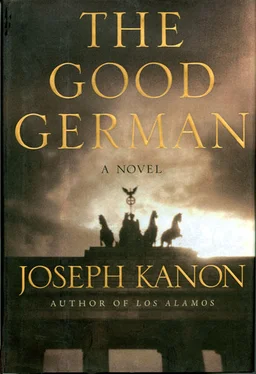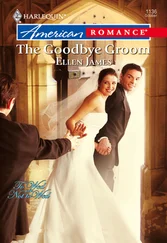“Here, try this,” he said, bringing her the coffee and giving her a doughnut. “It’s better if you dunk.”
“It’s not polite,” she said, laughing, but dipped it daintily and took a bite.
“See? You’d never know they were stale.”
“How do I look?” Hannelore said, coming in, hair pinned again like Betty Grable’s. “Doesn’t it fit well? A tuck here.” She pinched the side, then gathered up her purse. “Feel better, Lena,” she said, unconcerned.
“Don’t bring anyone back,” Jake said. “I mean it.”
Hannelore made a face at him, oddly like a rebellious teenager, and said, “Ha!” too full of herself to be annoyed. “Look at you, an old couple. Don’t wait up,” she said, pulling the door behind her.
“An old couple,” Lena said, stirring her coffee. “I’m not yet thirty.”
“There’s nothing to thirty. I’m thirty-three.” I was sixteen when Hitler came. Think of it, my whole life, Nazis, nothing else.“ She looked out again at the ruins. ”They took everything, didn’t they?“ she said moodily. ”All those years.“
“You’re not ready for a cane yet,” Jake said, and when she managed a smile he took her hand across the table. “We’ll start over.”
She nodded. “It’s not so easy sometimes. Things happen.”
He looked away. Why bring it up at all? But it seemed an opening.
“Lena,” he said, still not looking at her, “Rosen said you had an abortion. Was it Emil’s?”
“Emil?” Almost a laugh. “No. I was raped,” she said simply.
“Oh,” he said, just a sound.
“Does that bother you?”
“No.” A quick lie, without missing a beat. “How—”
“How? The usual way. A Russian. When they attacked the hospital, they raped everybody. Even the pregnant mothers.”
“Christ.”
“Not so unusual. It was ordinary then, at the end. Look how squeamish you are. Men do the raping, but they never want to talk about it. Only the women. That’s all we talked about then-how many times? Are you diseased? I was afraid for weeks that I had been infected. But no, instead a little Russian. Then, when I got rid of it, a different infection.”
“Rosen says it isn’t venereal.”
“No, but no more children either, I think.”
“Where did you get it done?” he asked, picturing a dark alley, the cliche warning of his youth.
“A clinic. There were so many, the Russians set up a clinic. ‘Troop excesses.’ First they rape you, then they—”
“Wasn’t there a doctor?”
“In Berlin? There was nothing. My parents were in Hamburg- god knows if they’re alive. There was nowhere else to go. A friend told me about it. Free, she said. So, another gift from the Russians.”
“Where was Emil?”
“I don’t know. Dead. Anyway, not here. His father’s still alive, but they don’t speak. I couldn’t go to him. He blames Emil for all this, if you can imagine.”
“Because he joined the party?”
She nodded. “For his work. That’s all it was. But his father—” She looked up. “You knew?”
“You never told me.”
“No. What would you have said?”
“Do you think it would have made a difference to me?”
“Maybe to me, I don’t know. And this room, when we came here, it was away from all that. Emil, everything. Somewhere away. Do you know what I mean? ”
“Yes.”
“Anyway, he wasn’t one of them. Not political. The institute, that’s all he cared about. His numbers.”
“What did he do during the war?”
“He never said. It wasn’t allowed, to talk about such things. But of course it was weapons. That’s what they all did, the scientists-make weapons. Even Emil, his head always in a book. What else could they do?” She looked up. “I don’t apologize for him. It was the war.”
“I know.”
“He said, stay in Berlin, it’s better. He didn’t want me to be part of all that. But then the bombing got so bad, they allowed the wives to go there with them. So the men wouldn’t worry. But how could I leave then?” she said, staring into the cup, her eyes beginning to fill. “What did it matter? I couldn’t leave Berlin. Not after Peter—” Her voice caught, drifting into some private thought.
“Who’s Peter?”
She looked up. “I forgot. You don’t know. Peter was our son.”
“Your son?” he said, stung in spite of himself. A family, with someone else. “Where is he?”
She stared back at the cup. “He was killed,” she said, her voice flat. “In a raid. Almost three.” Her eyes filled again.
He put his hand on hers. “You don’t have to tell me.”
But she hadn’t heard him, the words spilling out now, a purge.
“I left him in the kindergarten. Why did I do that? In the shelter all night I had him with me. He would sleep in my lap, not cry like the others. And I thought, well, that’s over, another night. But then the Americans came. That’s when they started like that-the British at night, the Americans in the day. No let-up. Eleven o’clock, I remember. I was shopping when the warning came, and of course I ran back, but the wardens caught me-everyone into the shelter. And I thought, the nursery’s safe, they had a deep cellar.” She stopped for a moment, looking away to the window. “Then after the raid, I went there and it was gone. Gone. All buried. We had to dig them out. All day digging, but maybe there was a chance. Then the screaming when they brought them out, one after another. We had to identify them, you see. Screaming. I went a little crazy. ‘Be quiet, be quiet, you’ll frighten them.’ Imagine saying such a thing. And the crazy thing was-Peter not a scratch, no blood, how could he be dead? But of course he was. Blue. Later they told me it was asphyxiation, you just stop breathing, no pain. But how do they know? I just sat there in the street with him all day. I wouldn’t move, not even for the wardens. Why? Do you know what it’s like, to lose a child? Both of you die. Nothing’s the same after that.“
“Lena,” he said, stopping her.
“All you can think is, why did I leave him there? Why did I do that?”
He got up and stood behind her, smoothing his hands on her shoulders, calming her.
“It’ll pass,” he said quietly.
She took out a handkerchief and blew her nose.
“Yes, I know. At first I didn’t believe it. But he’s dead, I know, that’s all there is to it. Sometimes I don’t even think about it anymore. Isn’t that terrible?”
“No.”
“I don’t think about anything. That’s what it’s like now. You know what I used to think, during the war? That you would come and rescue me-from the bombs, everything here. How? I don’t know. Out of the sky, maybe, something crazy. You’d just appear at the door, like yesterday, and take me away. A fairy tale. Like the girl in the castle. Now you’re here and it’s too late.”
“Don’t talk like that,” he said, turning her chair and bending down, looking up at her. “It’s not too late.”
“No? You still want to rescue me?” She ran her fingers across his hair.
“I love you.”
She stopped. “To hear that again. After all these terrible things.”
“That’s over. I’m here.”
“Yes, you’re here,” she said, her hands at the sides of his face. “I thought nothing good would ever happen to me again. How can I believe it? You still love me?”
“I never stopped. You don’t stop.” “But such terrible things. And now I’m an old woman.” He reached out and touched her hair. “We’re an old couple.” That night they slept close together, his arm around her, like a shield even bad dreams couldn’t get through. Contents — Previous Chapter / Next Chapter
Читать дальше












